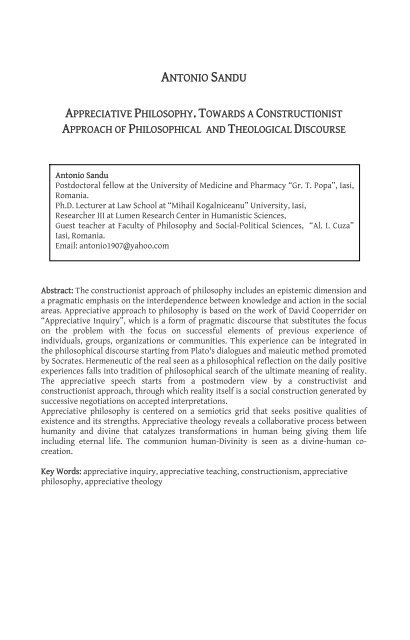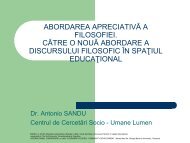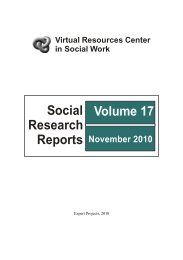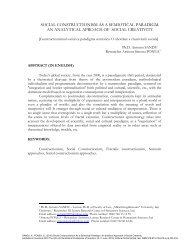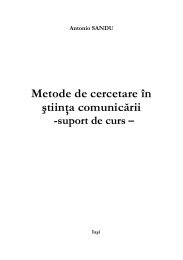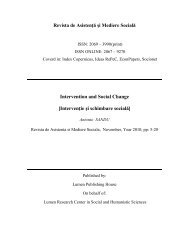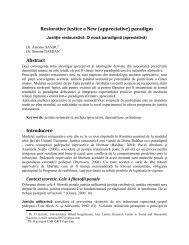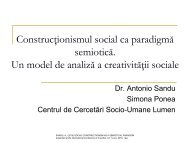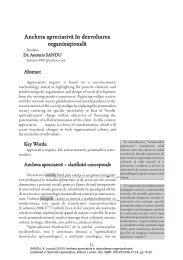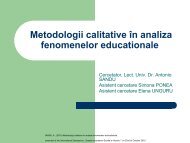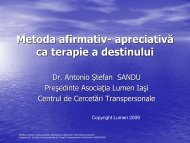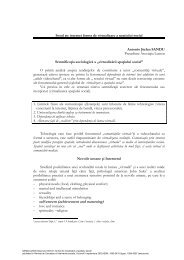appreciative-philosophy-towards-a-constructionist ... - Antonio Sandu
appreciative-philosophy-towards-a-constructionist ... - Antonio Sandu
appreciative-philosophy-towards-a-constructionist ... - Antonio Sandu
Create successful ePaper yourself
Turn your PDF publications into a flip-book with our unique Google optimized e-Paper software.
ANTONIO SANDU<br />
APPRECIATIVE PHILOSOPHY. TOWARDS A CONSTRUCTIONIST<br />
APPROACH OF PHILOSOPHICAL AND THEOLOGICAL DISCOURSE<br />
<strong>Antonio</strong> <strong>Sandu</strong><br />
Postdoctoral fellow at the University of Medicine and Pharmacy “Gr. T. Popa”, Iasi,<br />
Romania.<br />
Ph.D. Lecturer at Law School at “Mihail Kogalniceanu” University, Iasi,<br />
Researcher III at Lumen Research Center in Humanistic Sciences,<br />
Guest teacher at Faculty of Philosophy and Social-Political Sciences, “Al. I. Cuza”<br />
Iasi, Romania.<br />
Email: antonio1907@yahoo.com<br />
Abstract: The <strong>constructionist</strong> approach of <strong>philosophy</strong> includes an epistemic dimension and<br />
a pragmatic emphasis on the interdependence between knowledge and action in the social<br />
areas. Appreciative approach to <strong>philosophy</strong> is based on the work of David Cooperrider on<br />
“Appreciative Inquiry”, which is a form of pragmatic discourse that substitutes the focus<br />
on the problem with the focus on successful elements of previous experience of<br />
individuals, groups, organizations or communities. This experience can be integrated in<br />
the philosophical discourse starting from Plato's dialogues and maieutic method promoted<br />
by Socrates. Hermeneutic of the real seen as a philosophical reflection on the daily positive<br />
experiences falls into tradition of philosophical search of the ultimate meaning of reality.<br />
The <strong>appreciative</strong> speech starts from a postmodern view by a constructivist and<br />
<strong>constructionist</strong> approach, through which reality itself is a social construction generated by<br />
successive negotiations on accepted interpretations.<br />
Appreciative <strong>philosophy</strong> is centered on a semiotics grid that seeks positive qualities of<br />
existence and its strengths. Appreciative theology reveals a collaborative process between<br />
humanity and divine that catalyzes transformations in human being giving them life<br />
including eternal life. The communion human-Divinity is seen as a divine-human cocreation.<br />
Key Words: <strong>appreciative</strong> inquiry, <strong>appreciative</strong> teaching, constructionism, <strong>appreciative</strong><br />
<strong>philosophy</strong>, <strong>appreciative</strong> theology<br />
SANDU, (2011) Appreciative Philosophy. Towards a Constructionist Approach of Philosophical and Theological Discourse<br />
published in Journal for the Study of Religions and Ideologies, vol. 10, no. 28 (Spring 2011): ISSN: 1583-0039
<strong>Antonio</strong> <strong>Sandu</strong> Appreciative Philosophy<br />
Introduction<br />
Appreciative <strong>philosophy</strong> is centered on a semiotics grid that seeks<br />
positive qualities of existence and its strengths. Vicki Hammel 1 in his<br />
thesis Appreciative Philosophy: the Emerging Context and the Transformative<br />
Power of Co-creation believes that <strong>appreciative</strong> <strong>philosophy</strong> is a collaborative<br />
creative process completed by a social construction based on the<br />
significant results of the dialogue between stakeholders.<br />
Appreciative approach to <strong>philosophy</strong> is based on the work of David<br />
Cooperrider on “Appreciative Inquiry”, which is a form of pragmatic<br />
discourse that substitutes the focus on the problem with the focus on<br />
successful elements of previous experience of individuals, groups,<br />
organizations or communities. This experience can be integrated in the<br />
philosophical discourse starting from Plato's dialogues and maieutic<br />
method promoted by Socrates.<br />
In the context of postmodern constructionism, themes of<br />
philosophizing are pretexts of discursive construction or deconstruction<br />
of structures of thought foreshadowed by questioning the meanings of<br />
their approaches in the contemporary world. Philosophy is in its ultimate<br />
essence a problematical speech. The deconstruction of problematization,<br />
in our view, do not annihilate the philosophical concerns, but put them in<br />
relation with the individual experience which are interrogatively returned<br />
of the individual’s very own experience, of sources and meanings of them.<br />
The destiny of applied <strong>philosophy</strong> is to put in the hands of those who<br />
are interested in, very different ways of understanding and interpretative<br />
instruments regarding the continuous negotiation of interpretations<br />
processes and principles underlying them, and how to decrypt the hidden<br />
meanings in the very process of interpretation 2 .<br />
Constructionism and postmodernism<br />
Constructionism is seen as part of the postmodern paradigm because<br />
of models relativization and reporting reality to negotiation of<br />
interpretations. Constructionist epistemology is through its structure<br />
close to postmodernism, to Lyotard’s vision, according to which our<br />
picture of reality is a narration, a consensus of speech - considers<br />
Hacking 3 . The scientific discourse is a particular form of speech and can be<br />
analyzed in a <strong>constructionist</strong> manner as textual analysis.<br />
Constructionism can be methodological used based on the<br />
importance of the epistemic subject in the social construction of truth 4 .<br />
The concept of truth has therefore significance in relation to a socially<br />
accepted fact or experience. Social constructionism can be applied to a<br />
series of theories that have as a starting point Gergen's work.<br />
Constructionism 5 is concerned mainly with explaining the processes by<br />
Journal for the Study of Religions and Ideologies,<br />
SANDU, (2011) Appreciative Philosophy. Towards a Constructionist Approach of Philosophical and Theological Discourse<br />
published in Journal for the Study of Religions and Ideologies, vol. 10, no. 28 (Spring 2011): ISSN: 1583-0039
<strong>Antonio</strong> <strong>Sandu</strong> Appreciative Philosophy<br />
which people come to describe, explain and take note of the world they<br />
live in and it includes them. Campbell, Coldicott and Kinsella 6 believe that<br />
the <strong>constructionist</strong> view proposes a model through which reality is<br />
created in the process of communication and with language tools, each<br />
individual influencing and shaping the responses of others.<br />
Constructionist emphasis is on the network of interactions between<br />
individuals in the communication process. As a postmodern orientation,<br />
constructionism deconstructs the ontic in terms of independent existence,<br />
moving reality at the level of language experience. Significance and<br />
meaning of words are not given on a correspondence theory of truth but<br />
especially of a theory of social negotiation of the meaning and indirect of<br />
substitution concept of truth with the concept of adequacy and<br />
verisimilitude. Continuing the Campbell’s idea, we can consider that the<br />
illusion of ontological rupture between subject and object should be<br />
eliminated and replaced by a construct of inter-subjective reality 7 .<br />
Analyzing Van Nistel Roof’s opinion, Van der Haar considers the<br />
fundamental concern on constructionism as a sensification process -<br />
meaning creation- by which individuals give a meaning to the subjective<br />
experience on reality. There is a co-creating process of meaning through<br />
negotiations of interpretational attitude. Individuals are thus capable to<br />
produce different and parallels realities 8 .<br />
Van der Haar commenting the philosophical significance of<br />
constructionism indicates the adherence of this trend to an alternative<br />
epistemology because knowledge and reality analysis can only be the<br />
contingent of human relations being the result of continuous practice of<br />
reification, sedimentation and habitualization. The <strong>constructionist</strong><br />
perspective can not admit knowledge itself, free of any axiological<br />
foundation nor can conceptualize a disjunctively between subjective and<br />
objective which involves a clear distinction between knowledge and<br />
reality.<br />
The central premises of constructionism proposed by Van der Haar,<br />
from contributions of Burr, Gergen and Bouwen, are:<br />
Social constructionism assumes that the world cannot be<br />
known as it is but rather as a series of multiple socially<br />
constructed realities;<br />
Social constructionism sees language, communication and<br />
speech as having the central role of the interactive process<br />
by which we understand the world and ourselves;<br />
Social constructionism sees language and communication as<br />
a process of coordination of actors;<br />
Social constructionism deals with relational process through<br />
which social actors construct social realities;<br />
Social constructionism requires an exclusive distinction<br />
between subject and object; it is not a happy or necessary<br />
construction and therefore proposes the overcome of the<br />
Journal for the Study of Religions and Ideologies,<br />
SANDU, (2011) Appreciative Philosophy. Towards a Constructionist Approach of Philosophical and Theological Discourse<br />
published in Journal for the Study of Religions and Ideologies, vol. 10, no. 28 (Spring 2011): ISSN: 1583-0039
<strong>Antonio</strong> <strong>Sandu</strong> Appreciative Philosophy<br />
restrictive dualism that sees the two as existing<br />
independently of each other;<br />
Social constructionism adepts consider important the<br />
reflection on the social, cultural and historical fund of our<br />
assumptions and constructs and maintain of our openness to<br />
other possible realities constructed 9 .<br />
Constructionist Semiotics falls usually in the general trend of<br />
postmodernism promoting interdisciplinary knowledge. We prefer to<br />
place constructionism at the level of an area of intersection between<br />
postmodernism and transmodernism precisely because of the aspects of<br />
network analysis made possible by constructionism. Affirmative<br />
orientation specific to transmodernism can be exemplified in a particular<br />
area of constructionism: <strong>appreciative</strong> model.<br />
The social development, being essentially an integrative process 10 , is<br />
prone to transdisciplinarity, and that's why I chose this dimension of<br />
social practice to illustrate the interpretative drift of some social<br />
techniques caused by changes in a paradigm 11 offered by the shift from<br />
transmoderne epistemology centered on interconnection.<br />
Constructionism, as an epistemic method, is drafted by Burr through<br />
the following fundamental assertions:<br />
- The anti-essentialist nature of constructionism and critical<br />
understanding of access to knowledge 12 . This view precludes<br />
understanding the nature of knowledge as equivalent to the existence.<br />
According to this view what exists is what we can grasp, in one form or<br />
another, in a way that we can understand its very own existence. Our<br />
knowledge is rather dependent on the construction we rely on, in<br />
interpreting the real, the construction being developed in daily<br />
interactions between individuals.<br />
- Antirealism. The version of reality in which we live is socially and<br />
culturally constructed through interaction, and it can not be an objective<br />
fact but rather an assumption of a significant model 13 .<br />
- Historical and cultural relativism of knowledge and of the concept<br />
of truth 14 . All forms of knowledge, both scientific and common, have<br />
intrinsic historical and cultural specificity. Truth itself varies historically<br />
and culturally, as a concept based on social interaction processes by which<br />
people are related. Thus transdisciplinarity and interdisciplinarity is<br />
possible because globalization is a construct of contemporary culture.<br />
The constructionism itself has an anti-naturalist vision starting from<br />
the following perspectives: the theories do not describe reality itself but a<br />
rebuilt in consciousness, going to the point where it introduces in the<br />
theory entities whose existence there are no experimental evidence or<br />
observation, but make theory coherent, consistent and with measurable<br />
results. We can consider the measurement of results a consequence of the<br />
theory and the way of choosing the type of experience or observation to<br />
be made and an inherent pre-quantification of results that is expected to<br />
Journal for the Study of Religions and Ideologies,<br />
SANDU, (2011) Appreciative Philosophy. Towards a Constructionist Approach of Philosophical and Theological Discourse<br />
published in Journal for the Study of Religions and Ideologies, vol. 10, no. 28 (Spring 2011): ISSN: 1583-0039
<strong>Antonio</strong> <strong>Sandu</strong> Appreciative Philosophy<br />
be obtained. Thereby, the scientific theories, especially the contemporary<br />
ones, are themselves social constructs in a special form of social<br />
interaction called scientific research, and in a given social, cultural and<br />
historical context called contemporary science and the scientific<br />
community. Gergen moves the interpretive focus from reality to reality<br />
context and social network which generates for the individual the<br />
experience of reality. Gergen makes a remark <strong>towards</strong> the Cartesian<br />
vision, paraphrasing Descartes: “I am connected therefore I exist” 15 . By the<br />
paradigm change proposed by Gergen, epistemology becomes dependent<br />
to semiology, as “reality” itself is a sign constructed in a social convention.<br />
Religious background of affirmative (<strong>appreciative</strong>) paradigm<br />
The historical model of <strong>appreciative</strong> paradigm consists in Beatitudes<br />
Theology 16 . Appreciative theology reveals a collaborative process between<br />
humanity and divine that catalyzes transformations in human being<br />
giving them life including eternal life. The communion human-Divinity is<br />
seen as a divine-human co-creation. In this respect Tudor Ghideanu 17<br />
spoke about a theandric sense of love. The author states that, in the vision<br />
of Orthodox Theology, Creation is a movement generating love of God<br />
<strong>towards</strong> man. In the context of Christian spirituality “appreciation” is no<br />
longer a social construct that generates a positive semantic but a<br />
movement within God through which God becomes human and within the<br />
human He transfigures Himself in glorification. The term “theandric” in<br />
Tudor Ghideanu's vision is composed by juxtaposing of the Greek words:<br />
Theos-God and Andros- Man. The term means a bi-univocal passage<br />
between God and man. This passage is the very process of glorification.<br />
The co-creative process generates in Orthodox Christianity salvation and<br />
glorification.<br />
Christian process of salvation is a deliberate choice of positive<br />
inspired by the supreme power generating life which in the Orthodox<br />
vision is the Holy Spirit. Draining the passions (Kenosis) as a deliberate<br />
process of generating a positive sense make Christians approach each<br />
other and be together.<br />
New Testament theology is in essence a positive appreciation. The<br />
equivalent to the 10 Commandments in the redemptive work of Jesus<br />
Christ is the Beatitudes (Happy is the one who...). The Christian vision<br />
chooses to replace the retributive ethics with the affirmative one.<br />
Ethical approach as a logical construction is based on an axiological<br />
focus. A congruent philosophical system, from an axiological point of<br />
view, may, in principle, generate an ethical system. Christian ethics has, or<br />
should have, as a fundamental value love, value which seems to be the<br />
center of the axiological doctrine of Jesus Christ. “Love your neighbor as<br />
yourself” generates an ethical construction based on altruism and<br />
oriented <strong>towards</strong> alterity as a mean of ethical expression. A Christian<br />
Journal for the Study of Religions and Ideologies,<br />
SANDU, (2011) Appreciative Philosophy. Towards a Constructionist Approach of Philosophical and Theological Discourse<br />
published in Journal for the Study of Religions and Ideologies, vol. 10, no. 28 (Spring 2011): ISSN: 1583-0039
<strong>Antonio</strong> <strong>Sandu</strong> Appreciative Philosophy<br />
pragmatic could be seen as serving ones neighbor. The dimensions of<br />
Christian love aims at a first level for forgiveness, acceptance and<br />
commitment.<br />
Dimensions of affirmative ethics<br />
The ethical- axiological vetero- Testamentary system as we perceive<br />
it today has as a fundamental value reciprocity or retribution. The system<br />
appears to be expressed by the phrase “eye for eye, tooth for tooth”. The<br />
moral principles: Do not steal, do not lie, do not commit adultery, are<br />
applicable since there is a retribution-punishment for their violation. The<br />
logic of retribution has as an onto-axiological substrate the principle of<br />
autocracy. God does not allow competition and thus His will acts<br />
retributive. “I am your God, you shall not have other gods besides me”.<br />
Affirming the uniqueness of God is opposed to prohibition of alterity “you<br />
shall not have other gods besides me”.<br />
The prohibition of alterity, in fact the ban of accepting alterity or<br />
reporting to alterity is seen as a denial of the multiple possible. The phrase<br />
“I am your God, you shall not have other gods besides me” does not<br />
absolutely deny the existence of other gods but one is prohibited to report<br />
to them. A jealous and possessive God prohibits idolatry by law as a form<br />
of spiritual adultery. Ethical postulates are negative, being based on a<br />
categorical “shall not”. Operating in a limiting sense, they generate a<br />
pragmatic as: “what if”, an exacerbation of temptation, as a form of<br />
ownership of a non-negative freedom. Adam’s prohibition was violated<br />
because of an attitudinal assumption of freedom. It is interesting that the<br />
evil retort serpent was that in fact there is no retribution, that there are<br />
no consequences to actions. And yet according to the biblical myth there<br />
was a fall. In the logic of prohibition, any assumption of freedom proposes<br />
fall as an alternative.<br />
Are the two systems vetero and New Testament compatible from an<br />
axiological and ethical point of view? Christian Ethics proposes a positive<br />
pragmatic type: “Love and do what you want”. Love is the guarantee of<br />
positivism. Love transcends the prohibition, because is no longer negative<br />
as a punishment but positive as salvation. Salvation is not a retribution of<br />
good deeds as you might believe in the logic of a prohibition, but the<br />
affirmation of God's will as a saving intention. Salvation comes in the<br />
redemption of sins, which God himself through the sacrifice of his own<br />
Son unites logic of retribution with logic of freedom. Retribution<br />
continues to exist, but is absorbed by the grace of God. Fall is canceled by<br />
descent. Adam man fell from heaven, and Christ, the new Adam, went<br />
down first on earth then in hell. God assumes retribution thus generating<br />
redemption. Such an ethics is possible only in a theological affirmative<br />
system. God is love and does not require anything other than to show such<br />
love for Him thus He can be the one that works through you. Love is not<br />
Journal for the Study of Religions and Ideologies,<br />
SANDU, (2011) Appreciative Philosophy. Towards a Constructionist Approach of Philosophical and Theological Discourse<br />
published in Journal for the Study of Religions and Ideologies, vol. 10, no. 28 (Spring 2011): ISSN: 1583-0039
<strong>Antonio</strong> <strong>Sandu</strong> Appreciative Philosophy<br />
therefore an onto-axiological utopia to generate an impossible pragmatic<br />
but is seen as an affirmation of God in the world. The two ethical and<br />
axiological systems are thus disjoint from an ontic perception point of<br />
view but are praxiological complementary. It is interesting to note that<br />
the proposed ethical discourse of Jesus Christ was founded in the form of<br />
Beatitudes, opposed to the prohibitions of the Old Testament. Affirmative<br />
Ethics proposed by Jesus in the form of the Beatitudes, is neither<br />
restrictive nor mandatory but pragmatic as by applying these principles<br />
one can obtained a happiness state.<br />
Affirmative- <strong>appreciative</strong> ethic values. Success and grace<br />
In Protestant Ethic and the Spirit of Capitalism Max Weber makes an<br />
analysis on the types of society, generated by specific religious ethical<br />
vision. A society in which salvation is the privilege of the chosen ones and<br />
the sign is personal success generates in Max Weber's vision an<br />
individualistic society that represent the capitalism pragmatic roots of<br />
nowadays. “Work and individual success are forms of love to others<br />
because as fulfilling your mission you help the achievement of God's<br />
will 18 “. Salvation is seen by Protestants as grace that is working. Signs of<br />
grace are the individual successes and individual work. Work is itself<br />
asceticism made possible by manifestation of grace. Originality,<br />
authenticity is the triumph of individualism, nature and personal<br />
guarantee of success. Success is an axiological value generating ethics<br />
systems. The Christian phrase “Love your neighbor as you love yourself”<br />
derives in American neo-protestantism vision an ethic vision which<br />
proposes valuing the individual. The overturning of the Christian phrase is<br />
understood as well as: if you do not love yourself you can not therefore<br />
love your neighbor. Love of neighbor is a bi-univocal connection with<br />
alterity. Moving focus from love to neighbor, the logical Ethics of Weber<br />
focuses on selfishness. The phrase “as you love yourself” means a measure,<br />
as much but as well as how. Lack of love, of self esteem, implies lack of love<br />
<strong>towards</strong> neighbor, placing us in a logic of as much. As little as you love<br />
yourself you can love your neighbor as well. At the same time there is the<br />
logical as that can be expressed by the Romanian saying “What you do not<br />
like for you do not do it to another”. Opposite to logic of love that is<br />
essentially a logic of complementarity, completeness and reflection in the<br />
other, individualism, is the other side of ego alterity relationship. Not<br />
accidentally contemporary psychology emphasizes personal development<br />
techniques, and focusing on success. Weber considers that the<br />
individualistic paradigm has its origins in the religious sense of the<br />
presence of Grace. Grace, God's grace acting essentially free, even<br />
indifferent to human actions, transposes the chosen ones into a special<br />
status of ontological aristocracy, as God's chosen, as privileged of God’s<br />
will. God's will is free, and the grace which flows from the sacrifice of Jesus<br />
Journal for the Study of Religions and Ideologies,<br />
SANDU, (2011) Appreciative Philosophy. Towards a Constructionist Approach of Philosophical and Theological Discourse<br />
published in Journal for the Study of Religions and Ideologies, vol. 10, no. 28 (Spring 2011): ISSN: 1583-0039
<strong>Antonio</strong> <strong>Sandu</strong> Appreciative Philosophy<br />
is given by God to His chosen ones. The sign of the chosen ones must be a<br />
form of restoring heaven on earth. This restoration of heaven is the very<br />
success. Success becomes thus a “metaphysical” category, a participation<br />
of the chosen ones to ontological extreme situations caused by the<br />
presence of God. In popular language we could say that “those loved by<br />
God” are helped by God. Work ethic is a combination between the idea of<br />
success as a guarantee of Grace and the idea of the resemblance with God.<br />
God works through people and for people, so work is a way of accessing<br />
the divine through its presence in its own work. “I can see God as He<br />
works through me”. Weber’s explanation leaves open the discussion on<br />
how ontological individualism becomes praxiological individualism.<br />
Personal success as a special ontological status of the one becomes<br />
personal success as the socially privileged of fate.<br />
Affirmative- <strong>appreciative</strong> ethics and vocational theology<br />
Spiritualist religious foundation of Western postmodern and<br />
transmoderne society is evident in the way its values are implemented.<br />
Export of democracy achieved by the USA for example is made on behalf<br />
of God's will. U.S. and its allies bear always a decisive battle with evil<br />
either communist, terrorist, etc. George Bush presented America as having<br />
a divine mission to export democracy and the American model in the<br />
world 19 . Theology of vocation is the model of ethics success transposed<br />
from the success of an individual chosen by God to the success of the<br />
chosen people. Ideology of the chosen people is not new, although being at<br />
the origin of Old Testament writings, but also the medieval Crusades, the<br />
rise of the Third Reich and the anti-terrorist war fought by the U.S.<br />
Success as a guarantee of choice by God is both at the individual and<br />
community level. A nation considers itself chosen either because an<br />
ancestor made a pact with the Divine, or because they simply believe in a<br />
God who prefers and chooses it under this preference. The axiological<br />
foundation of this model is ownership. Ontological privilege is derived<br />
from membership of a chosen people, a chosen community, etc.<br />
Logics of membership ethics is today the foundation of identity<br />
construction. Constructed identity as belonging to a community, gives<br />
force to the individual by guilt diffusion feeling on one hand and by<br />
consistency of power on the other hand. Membership ethics is in an<br />
axiomatic system of God is on our side type. The will of God is identified<br />
with the will of the group or leader. The existence of a primus inter paraes<br />
generates praxiological autarkic systems, because the most untitled is the<br />
one chosen by God, who knows, transmits and applies God's will. The<br />
elimination of primus inter paraes creates ethical democracy by<br />
introducing additional equality value. Equality can find its spiritualist<br />
foundation according to which people are actually children of God, even if<br />
not by birth, but by adoption (as sons of Abraham in Judaism, as brothers<br />
Journal for the Study of Religions and Ideologies,<br />
SANDU, (2011) Appreciative Philosophy. Towards a Constructionist Approach of Philosophical and Theological Discourse<br />
published in Journal for the Study of Religions and Ideologies, vol. 10, no. 28 (Spring 2011): ISSN: 1583-0039
<strong>Antonio</strong> <strong>Sandu</strong> Appreciative Philosophy<br />
of Christ by baptism into Christianity). Establishment of identity is made<br />
in the communion of the chosen ones. The chosen ones are self-set as a<br />
church, people, nation, etc. Ethics membership is also an ethics of<br />
difference.<br />
Membership is not an ethical axiological principle, but tends to<br />
become an ontological establishing. Membership is becoming as well a<br />
pseudo-epistemic principle. Guarantee of truth is the membership of the<br />
chosen, the wise, the lighting, etc. community. As an ethics of difference,<br />
it experiences conflict drama of otherness. The existence of other<br />
legitimates the opportunity of ontological privilege on one hand and on<br />
the other hand it offers the temptation of isolation. Identity isolation<br />
proposed the solution of otherness as a punishment. Dealing with<br />
otherness is anguish: You're either with us or against us. The Supreme<br />
Otherness is God who is seen in vocational theology systems as a God who<br />
prefers. Contradiction at a logic level is that God, Absolute and Immutable<br />
Transcendence makes an act, that of preferring. God gets out of the state<br />
which is The one that exists, into the state of Abraham’s, Isaac’s and Jacob’s<br />
God that is the one who chooses. The choice requires freedom issues<br />
related to evil issues. Evil is a logical guarantee of freedom. Thus the<br />
construction of identity opens in front of the other. Whether the other is<br />
evil or just different he is “to be known”. Community Ethos proposes<br />
several solutions for the treatment of otherness. The first such solution is<br />
universalism. Community takes everything into possession and becomes<br />
the institution that gives meaning, and becomes meaning itself. Thus God<br />
can return to Transcendence as community, church are founded.<br />
From an atonement ethics to a welfare society<br />
Max Weber believes that the Catholic ethic is an ethic of intention<br />
and atonement 20 . This vision of finitude combined with the ethics grace<br />
which is mediated by the church determines the creation of a social<br />
welfare society of totalitarian model, as opposed to liberal individualism.<br />
Mediation access to transcendence is fundamental. Without the<br />
contribution of the church salvation is not possible. There is no salvation<br />
through individual effort. The Original Sin cancels the access of human to<br />
salvation through personal effort. The Church as the Body of Christ is<br />
grace storage. It is no accident that art has flourished particularly in areas<br />
where the Catholic Church has imposed it as an external manifestation of<br />
the absolute greatness of the church that represents Christ on earth.<br />
The rise of environmental, feminist and ethnic movements have<br />
brought to the foreground the fundamental issues faced by man and<br />
society in the 20th century. Gilles Lipovetsky claims that the phrase “age<br />
of minimalism” is better suited to the postmodern society than “the<br />
society of generalised permissiveness”. Lipovetsky 21 believes that the<br />
postmodern society is a post-moralist one, at the twilight of duty.<br />
Journal for the Study of Religions and Ideologies,<br />
SANDU, (2011) Appreciative Philosophy. Towards a Constructionist Approach of Philosophical and Theological Discourse<br />
published in Journal for the Study of Religions and Ideologies, vol. 10, no. 28 (Spring 2011): ISSN: 1583-0039
<strong>Antonio</strong> <strong>Sandu</strong> Appreciative Philosophy<br />
Transmodern (“hypermodern” in Lipovetsky’s reading) ethics establishes<br />
moral norms based on liberal, pluralist and pragmatic principles. All forms<br />
of negation morals are abandoned: not only had that anchored in<br />
ontology– such as the paradigm of the God who picks favourites or of the<br />
jealous God –even the contractualist perspectives, applied in the modern<br />
period, are no longer significant. The preferred focus is on the value of<br />
positivism, of cooperation as a source of efficiency, of personal<br />
enrichment – be it cultural, spiritual or moral – derived from the access to<br />
alterity. Tolerance as an ethical value is legitimised by a utilitarian<br />
humanism. The social contract is rather a need for togetherness going<br />
beyond spiritual space in the space of social cohabitation. Another value<br />
generating coherent systems in transmodern ethics is happiness. Crass<br />
hedonism and consumerism result in moral sterility an ethics that defines<br />
itself as being beyond morals: neither moral, nor immoral, but instead<br />
amoral 22 . We are dealing with a secularization of morals from the<br />
perspective of the ontological “emptying” of reality 23 and its<br />
transformation, in a constant identification of the meta-narratives<br />
established in interpretative conventions 24 . The lack of an anchor in<br />
ontology and the placement of absolute freedom and happiness at the top<br />
of the axiological priority list generate an ethics of admitted difference<br />
and, at the same time, of minimising ethical negation. We can put<br />
transmodernism in relation to the network society into the hive society, as<br />
a continuation of postmodernism, presenting itself as a society of<br />
generalised spectacle, established on the basis of the theory of games and<br />
on the exacerbation of seduction strategies – more precisely on simulation<br />
and seduction strategies 25 . The categorical imperative is displaced by that<br />
of unlimited action, however implying the existence of consequences; the<br />
latter are limited to the pragmatic. However, not doing evil within the<br />
limits where evil is punished does not mean doing good. Constructionist<br />
voluntarism anchors action in personal and social fulfilment as a formula<br />
for maintaining happiness.<br />
Freedom as an affirmative experience<br />
Horrific scenes of violence in places such as Guantanamo Bay and<br />
Abughraib require redefining freedom in the contemporary context.<br />
Violence experience constitutes a problem itself. Reformulating the<br />
problem of freedom in the contemporary world from a specific<br />
kaleidoscopic world that maybe fractal developed by denying the major<br />
structural approaches through the convergence of completely disparate<br />
sequences. The method of this research is addressing the<br />
phenomenological structuralism, through deconstruction of reality<br />
understood as the negotiation of interpretations. The historic event in<br />
itself is reconstructed as meaning through a process of “negotiating<br />
interpretations”. In this process the reformulation of significance matters<br />
Journal for the Study of Religions and Ideologies,<br />
SANDU, (2011) Appreciative Philosophy. Towards a Constructionist Approach of Philosophical and Theological Discourse<br />
published in Journal for the Study of Religions and Ideologies, vol. 10, no. 28 (Spring 2011): ISSN: 1583-0039
<strong>Antonio</strong> <strong>Sandu</strong> Appreciative Philosophy<br />
more as the same event under a different language agreement is<br />
completely phenomenological altered.<br />
Fractal reconstruction integrates kaleidoscopic aspects of various<br />
interpretations starting from the identification of discursive and<br />
interpretative constants existing after cultural contamination.<br />
Kaleidoscopic aspect is programmatic to respect “the ideal of linguistic<br />
structures deconstruction” and conventions of language. Based on the<br />
indicated methodology we will analyze the existential meanings of<br />
historical and social phenomena in terms of understanding social and<br />
historical reality as a construct that was generated through a “reframing”<br />
of interpretation. The issue of freedom becomes “a pretext” for the<br />
hermeneutic process of initiation of significant construction act. The<br />
concept of freedom itself is one such construct which is operated through<br />
the significant process to the extent that it can draw around it an<br />
interpretive agreement. In our view obtaining an interpretive consent can<br />
be based on assumptions already accepted by interlocutor and the<br />
cognitive resonances that each of the interlocutors manifest.<br />
Contemporary philosophical discourse is no longer limited to<br />
argumentative strategies, contemporary rhetoric being a significant part<br />
of the speech as a seductive strategy for an interpretative<br />
“empowerment”. More specifically the speech does not explain and<br />
persuade but rather persuades seeking “raising the interlocutor” to the<br />
level of “abstraction” necessary for interpretive convergence.<br />
Philosophy as any act of communication is achieved by<br />
“manipulating fantasy” 26 . Philosophical text is not meant to solve<br />
problems but raise other forms of human knowledge interrogations.<br />
Philosophy does not teach you to “boil a cabbage” but the specific spirit of<br />
questioning opens to science the possibility of a relationship between<br />
cabbage and pot. The joke of boiling cabbage is a memorial to the futility<br />
of what <strong>philosophy</strong> does most important and that is specific query about<br />
the relationship between universals. Having freedom as our pretext of<br />
speech, we will try to find a kaleidoscopic space to show it and pursue an<br />
interpretative derive of its meaning in the contemporary world.<br />
Freedom as an experience for transcendence access<br />
The contemporary world is faced with complex socio-political<br />
phenomena, which involve upgrading of the issues of freedom, thus it can<br />
meet the interpretative requirements specific to postmodernism. The<br />
issue of freedom will be combined with the determination issue and<br />
through extension with the limitation issue. Absolute freedom defined as<br />
the ability to “make” any wish, at any moment of time and space, is an<br />
attribute of Deity. In the sphere of humanity, freedom comes up against<br />
limits. Shaping individual identity, and with it his freedom, is made<br />
subjectively through limiting and difference experience.<br />
Journal for the Study of Religions and Ideologies,<br />
SANDU, (2011) Appreciative Philosophy. Towards a Constructionist Approach of Philosophical and Theological Discourse<br />
published in Journal for the Study of Religions and Ideologies, vol. 10, no. 28 (Spring 2011): ISSN: 1583-0039
<strong>Antonio</strong> <strong>Sandu</strong> Appreciative Philosophy<br />
Freedom itself knows its own borders either spiritual or cultural,<br />
personal, political, etc. Limiting the transcendence of freedom generates<br />
in <strong>philosophy</strong> the problematic of metaphysics. The question: “What is<br />
what?” to receive a different response than a negative one like “existence<br />
is not” or tautological one such as “existence is what is” it must refer to<br />
the category of freedom. This makes the being to self-determine in<br />
relation to the void, says Heidegger 27 . While the Absolute has as an<br />
attribute the absolute freedom, the existence determined by objects and<br />
phenomena, contains inherent freedom in a quantitative way.<br />
Compared to some things or events, an individual can be free in the<br />
sense that he can make or not make them and to others that freedom is<br />
lacking. The limit of freedom is called constraint. Several such constraints<br />
outlined in the metaphysical level are called categories. For example space<br />
is a limiting category in the “omnipotence of spreading”. An individual can<br />
exist in a single point in a certain moment in time, while the divine<br />
omnipotence is simultaneously acting in the whole space.<br />
Temporality can be understood as limitation for the “omnipotence of<br />
efficiency” creative, whereas from metaphysical point of view time<br />
introduces the causal determination. An event called effect necessarily<br />
follows another event called cause. The two concepts are related as that<br />
the happening of the second (effect) is a sign of the previous existence of<br />
the first (cause). Conversely the presence of the cause provides further<br />
effect. Of course the causes are multiple and can be categorized according<br />
to various criteria among which the most important is the certainty of<br />
causal relationship, in other words, the certainty with which the presence<br />
of the effect can be inferred from the existence of the cause and reverse<br />
the existence of cause in the presence of effect.<br />
Another type of limitation may be viewed as limiting the knowledge.<br />
Divine omniscience is limited in the specific human knowledge as a<br />
relative knowledge based on the distinction between subject and object.<br />
The human specifically knowledge, says Kant 28 , has a categorical character<br />
referring to the “phenomenon” that is how the “thing itself” interact with<br />
our own conscience. The issue of freedom for the human being can be<br />
linked with the need.<br />
The dialectic of freedom - need is solved under the dialectic form of<br />
free will - preset. Free will generally means the ability to orient you<br />
<strong>towards</strong> values and to make choices in full consciousness. Determining in<br />
this context is to prevent any form of free choice of the individual. With<br />
free will comes the issue of liability. The ability to choose invests you with<br />
responsibility for the choices made. If God is omnipotent and omniscient,<br />
we ask ourselves why He allows the existence of evil and transgression<br />
(sin). Fatalism, on the other hand is facing a similar problem of<br />
justification, since the lack of freedom, responsibility for human actions<br />
belongs to divinity, but their remuneration shall accrue to the individual.<br />
The dilemma is resolved in different ways depending on the specifics of<br />
Journal for the Study of Religions and Ideologies,<br />
SANDU, (2011) Appreciative Philosophy. Towards a Constructionist Approach of Philosophical and Theological Discourse<br />
published in Journal for the Study of Religions and Ideologies, vol. 10, no. 28 (Spring 2011): ISSN: 1583-0039
<strong>Antonio</strong> <strong>Sandu</strong> Appreciative Philosophy<br />
various philosophical current: for Stoics for example, freedom is equal<br />
with the understood need. Man can not preclude the need, but<br />
understanding it can reach peace of mind.<br />
Christian <strong>philosophy</strong> through St. Augustine affirms the existence of<br />
free will as part of human nature. Elections are free and the individual is<br />
liable even if God has a prescience of these elections. Martin Luther, on the<br />
other hand, will affirm the determination and lack of free will. Lutheran<br />
doctrine has as a social effect the diluting of the moral through lack of<br />
responsibility. From the perspective of social <strong>philosophy</strong> we are interested<br />
in transforming mentalities generated by a religious faith. Grace theology<br />
founded by Luther is also a theology of freedom. In his conflict with<br />
Erasmus from Rotterdam Luther criticizes him as being partisan theorist<br />
of free will according to which man is free to choose between doing good<br />
deeds that will lead to salvation, or bad things that will lead him to eternal<br />
damnation.<br />
By contrast, Luther emphasizes free will as a fiction as there is not<br />
inside the man the power to perform good or bad deeds 29 . All the works of<br />
man, as well as everything that happens in the world is the result of a pure<br />
necessity and strict determinations. This opinion is shared by Martin<br />
Luther, denying the existence of free will because it is contrary to God's<br />
absolute will. Nothing can happen, considers Luther, if God does not want<br />
it to happen. This view is challenged by Erasmus and other scholars<br />
because in the absence of free will there is no liability on the facts and no<br />
justification for punishment. Although Luther denies the existence of free<br />
will, gives rise to a theology of grace which suppresses, at least at the level<br />
of premises, the liability.<br />
Man can not do anything to attract grace or reject it as God's will is<br />
sovereign. The subtext is the idea that if any action is done out of<br />
necessity and there is no real responsibility for it, then at least the social<br />
freedom is total and partly anarchic. The result of this anarchic freedom<br />
was the very first peasant wars that Luther criticizes.<br />
However, Luther introduced in social <strong>philosophy</strong> the distinction<br />
between spiritual freedom absolutely inexistent for Luther and the social<br />
political freedom which became complete for his followers. Postmodernity<br />
has as foundation the imperative of freedom. Freedom is seen<br />
as both creative attitude and the rejection of shape, or any structural<br />
frames. Post modernity requires waiver to subordinating to form as<br />
expression of over-sensitivity and proliferation of possible worlds to the<br />
detriment of the real world.<br />
Having as foundation the ontical expression “God is dead” the<br />
metaphysical center of post modernity migrates from absolute to human:<br />
from a metaphysics query and an artistic search of “What is” postmodern<br />
shifts from ontical view to “what is for us” or “ What does for us mean<br />
what is for us”. Contextual, “what is” becomes negligible in front of “what<br />
is represented” that is what we can configure.<br />
Journal for the Study of Religions and Ideologies,<br />
SANDU, (2011) Appreciative Philosophy. Towards a Constructionist Approach of Philosophical and Theological Discourse<br />
published in Journal for the Study of Religions and Ideologies, vol. 10, no. 28 (Spring 2011): ISSN: 1583-0039
<strong>Antonio</strong> <strong>Sandu</strong> Appreciative Philosophy<br />
Freedom is no longer an understood necessity. Freedom is the<br />
foundation of difference. The right to be different certifies our level of<br />
reality. In other words, the more I exist, the more I manifest myself as<br />
different. Tyranny expressed by harmonics and order obsession is<br />
replaced by an obsession with promotion, as a person, as a group: social,<br />
political, cultural, etc. promotion.<br />
Appreciative teaching of <strong>philosophy</strong><br />
Social <strong>constructionist</strong> <strong>philosophy</strong> states that the learning is primarily<br />
an active and ongoing process of “construction” of new knowledge, from<br />
social interaction in peer groups, or a sustained interaction with the social<br />
environment 30 . We can not emphasize the close relationship between<br />
philosophical research and teaching <strong>philosophy</strong> 31 . The <strong>constructionist</strong>-<br />
<strong>appreciative</strong> pedagogy model has two fundamental dimensions:<br />
the social – <strong>constructionist</strong> dimension of education<br />
education focused on appreciation and success.<br />
Social <strong>constructionist</strong> pedagogy states that the learning activity 32 is<br />
primarily an active and ongoing process of “construction” of new<br />
knowledge from social interaction in peer groups, or a sustained<br />
interaction with the social environment. Learning is effective when<br />
knowledge and skills acquired by trainees are systematically used in social<br />
situations different than those in which they were taught. Student's mind<br />
should not be treated like a database that stores information read or<br />
exposed in a course. Educational partnership between the educator and<br />
the educated replaces the social construct called learning, on a self-<br />
discovery dimension, which catalyzes the motivational and cognitive<br />
abilities of the student to maximum update their potential, both for the<br />
educated and the teacher.<br />
Education focused on appreciation and success has the following<br />
elements proposed by O'Connor and Yballem 33 :<br />
Focusing on the personal experience of the educated and<br />
trainers, especially the positive element of the experience,<br />
Focusing on the successes and winning strategies,<br />
Educational partnership relationship.<br />
The teacher's role is changing from the transmitter of information to<br />
facilitator of their own curriculum design for consumers of education<br />
services.<br />
Appreciative teaching uses a methodology based on collaborativediscovery<br />
learning process 34 . The learner is seen as a partner of the<br />
teacher in this process. Educational partnership 35 aims not the system of<br />
transmission of information (content knowledge), but the formation of<br />
communication skills and attitudes 36 both to the student and teacher.<br />
The idea of <strong>appreciative</strong> seminars starts from a new vision on<br />
education that we see as a partnership centered on equality between<br />
Journal for the Study of Religions and Ideologies,<br />
SANDU, (2011) Appreciative Philosophy. Towards a Constructionist Approach of Philosophical and Theological Discourse<br />
published in Journal for the Study of Religions and Ideologies, vol. 10, no. 28 (Spring 2011): ISSN: 1583-0039
<strong>Antonio</strong> <strong>Sandu</strong> Appreciative Philosophy<br />
students and teachers, in which each one reveals its creative potential<br />
bringing his contribution to social development of its own and of others.<br />
Peer equality transforms “the social distance” between partners of the<br />
educational act by moving the focus from the difference in volume of<br />
knowledge, to equality of the creative potential ability to produce<br />
efficiencies in the area of expertise of each one. The use of <strong>appreciative</strong><br />
seminars methodology is not limited at teaching <strong>philosophy</strong> in academic<br />
environment, as it was shaped to be a form of applied <strong>philosophy</strong>.<br />
Appreciative seminars are generally form of <strong>appreciative</strong> summit<br />
which begins to identify the positive and the mutually transforming<br />
resources both of the learners and trainers by stimulation of the<br />
collaborative creativity. There is not just a simple “act of discovery” that<br />
the student makes, guided by a trainer. It can be seen as a research<br />
(inquiry) and at the same time a “festival of discovery” (research as<br />
celebration). The stimulation of the student’s questioning potential can be<br />
done starting from the principle that a system evolves in the direction in<br />
which the questions are raised. The construction of <strong>appreciative</strong> seminars<br />
starts from the identification of the student’s creative and cotransforming<br />
potential and less the relevant knowledge they possess. The<br />
identification of the positive in knowledge takes form as success<br />
experiences appreciation, in collaborative learning, the moments in which<br />
students were successful in learning and strategies that led this success. In<br />
this case, the educational act is to us an “empowerment” process of all<br />
those involved. This process aims to transfer successful strategies that<br />
learners and trainers have identified in different learning situations to the<br />
new formative context.<br />
The stimulation of student’s participation is achieved by<br />
transforming “the learning task centered group “into a learning team. The<br />
removal of specific formal and classical education process and the focus on<br />
the playful learning techniques including role play, or other methods of<br />
stimulating learning in a group with mainly playful nature, transforms the<br />
act of learning into a “festival of discovery” and learning context into “the<br />
best framework “ of the creative potential auto-update. The development<br />
of the skills is seen in the <strong>appreciative</strong> pedagogy as a successively passed<br />
process through stages of identifying successful strategies and positive<br />
experience, how to use the skills through a co-transforming and playful<br />
act and the application of these skills in the suited field where “they work<br />
best for us.”<br />
In introducing the <strong>appreciative</strong> methods in education, a model can be<br />
“collaborative centering on a task”, that means the identification of a<br />
motivating task for students which will be achieved in teams, <strong>appreciative</strong><br />
peer review, stage in which colleagues will highlight the positive<br />
successful elements of the team, originality, innovative, etc. of each<br />
colleague and not least, the transforming of learning into research by<br />
selecting a task which involves discovering and producing new.<br />
Journal for the Study of Religions and Ideologies,<br />
SANDU, (2011) Appreciative Philosophy. Towards a Constructionist Approach of Philosophical and Theological Discourse<br />
published in Journal for the Study of Religions and Ideologies, vol. 10, no. 28 (Spring 2011): ISSN: 1583-0039
<strong>Antonio</strong> <strong>Sandu</strong> Appreciative Philosophy<br />
Another specific element of <strong>appreciative</strong> seminars is the different<br />
position from the known elements (their reframing), the difference in<br />
understanding of symbolic elements and overcome the interpretative<br />
conventions that limit knowledge in one direction. The opening pretext of<br />
collaborative research can be the <strong>appreciative</strong> and systematic analysis of<br />
an event (this can mean everything: from a religious, social or political<br />
event, to analyzing a movie, developing an essay, a research). Another<br />
<strong>appreciative</strong> reframing element used by us, is the free discussions session<br />
focusing on positive affirmation. Students are encouraged to explore any<br />
new element which they consider significant in terms of their past<br />
experiences. The pretext of discussion can be any element of everyday<br />
experience, their own successful stories, a new approach of a topic or of a<br />
social context, etc. The pretext of opening <strong>appreciative</strong> collaborative<br />
research is “the playful frame” which we call “learning context”. This can<br />
be outlined as a goal of the seminar, reserving some time for <strong>appreciative</strong><br />
dialogue, or may constitute the general framework of the seminar, when<br />
the approached themes are built gradually through dialogue between<br />
students and teachers. The main <strong>appreciative</strong> dialogues theme is chosen<br />
from the proposals of the students. The dialogue is oriented so that<br />
students can “discover” the innovative elements and appreciate them as<br />
their own, encouraging them to pursuing with the interpretative<br />
approach, oriented on the discovery of new and creative elements in the<br />
studied domain.<br />
4D model in <strong>appreciative</strong> teaching<br />
The origins of this technique may be identified in an approach called<br />
“<strong>appreciative</strong> inquiry”, proposed by Cooperrider in the area of<br />
organizational development 37 , later taken over by areas such as<br />
psychology 38 , theology 39 , social work 40 , political sciences 41 , adult<br />
training 42 , organizational development 43 , programme evaluation 44 ,<br />
coaching 45 , planning 46 , analysis of minorities 47 , supervision 48 etc. The<br />
<strong>appreciative</strong> inquiry has a quadriphasic structure, called “4-D cycle” in<br />
literature. Narratological character of <strong>appreciative</strong> inquiry allows<br />
theoretical construction of educational meta-models. We will present in<br />
the following lines a form of the 4D model applications (Discovery, Dream,<br />
Destiny, Design), in terms of philosophical content exposure. This<br />
approach can be used in teaching different topics like <strong>philosophy</strong> of<br />
religion, ethics, social <strong>philosophy</strong>, legal studies, but also metaphysics,<br />
epistemology 49 or systematic <strong>philosophy</strong>.<br />
We propose a model to build a series of “<strong>appreciative</strong> seminars”<br />
starting from the philosophical theme of “freedom in the contemporary<br />
religious and laical ethics” as a hermeneutical pretext 50 using the 4D<br />
model previously presented.<br />
Journal for the Study of Religions and Ideologies,<br />
SANDU, (2011) Appreciative Philosophy. Towards a Constructionist Approach of Philosophical and Theological Discourse<br />
published in Journal for the Study of Religions and Ideologies, vol. 10, no. 28 (Spring 2011): ISSN: 1583-0039
<strong>Antonio</strong> <strong>Sandu</strong> Appreciative Philosophy<br />
Discovery (Discovery the freedom)<br />
Phase I ( DISCOVERY): the stage of discovering positive “stories” and<br />
disseminating them. The starting point of the inquiry is the selection of<br />
affirmative/positive topics; starting from the assumption that the<br />
individual evolves in the direction where questions are asked. The choice<br />
of <strong>appreciative</strong> seminars topics is significant and strategic; the topics are<br />
formulated in affirmative terms and must be connected to the area in<br />
which the individual wishes to evolve, hence in the areas where they can<br />
be empowered. The <strong>appreciative</strong> teaching that we proposed, takes the<br />
model of positive stories as a focus on the student’s best experience, on his<br />
very own significance for the proposed topic of freedom in our example<br />
that it is already in his consciousness. The starting point of discussion is<br />
the selection of positive / affirmative topics, assimilating that knowledge,<br />
including the students’ way of understanding freedom from his personal<br />
previous experiences. It is explored the correlation between ethical and<br />
religious vision of the student and his behavior. The themes are set in<br />
positive terms and must be related to the field in which the knowledge of<br />
students is desired to be amplified. Van der Haar 51 believes that at this<br />
stage we realize the appreciation upon what gives life and energy to<br />
individuals, students in our case, related with the discussed topic. It is a<br />
stage of positive stories analysis reported on their experience 52 , prior to<br />
the proposed topic. This positive experience represents the core positive<br />
change. At this level the analysis does not concern only positive<br />
experiences, but also fundamental matters regarding the individuals as<br />
spiritual beings. In the following lines there are extracted the positive<br />
elements from their own experience of forgive or be forgiven, by focusing<br />
the educational <strong>appreciative</strong> interview to them. The presentation of<br />
problems by a subject is not locked in a directive way but rather analyzed<br />
in terms of methodological challenges and questioning the successful<br />
stories in similar situations, that can be transferred.<br />
In our example regarding the “forgiveness and freedom” topic we<br />
can tackle the following themes of <strong>appreciative</strong> discovery:<br />
It seeks to highlight the very own experience of freedom in religious<br />
and the phenomenological way.<br />
It may concern the inner experience of freedom connected with a<br />
religious or laical experience of forgiveness, of responsibility, faith and<br />
limitations, free will etc.<br />
The speech is focused on the positive value of freedom as a human<br />
experience the ultimate instance of freedom for themselves.<br />
Dream (Dream - freedom as possibility)<br />
Phase II (DREAM). Van der Haar emphasizes the importance of<br />
alternative thinking, that overcomes the limits, by creating <strong>appreciative</strong><br />
vision of the future based on experience 53 , historical ones and new<br />
understanding of present, process previously called by us as the<br />
Journal for the Study of Religions and Ideologies,<br />
SANDU, (2011) Appreciative Philosophy. Towards a Constructionist Approach of Philosophical and Theological Discourse<br />
published in Journal for the Study of Religions and Ideologies, vol. 10, no. 28 (Spring 2011): ISSN: 1583-0039
<strong>Antonio</strong> <strong>Sandu</strong> Appreciative Philosophy<br />
hermeneutic of real. Bernie Carter 54 argues that the dream stage or<br />
building the dream adopts a series of creative and positive image of the<br />
future based on the thinking type “outside the boundaries”. Educational<br />
interview contains elements of symbolic challenge with the role of<br />
anticipation of knowledge and to enable the transformative effort.<br />
The dream phase can correlate freedom with opportunity:<br />
It aims to build a series of strategies that evaluate the possible, and<br />
build the future starting from there. It examines the impact of decisions<br />
on possible lines of future.<br />
Design (Construction of freedom)<br />
Phase III (Design) is using the collected data in the first two stages,<br />
once students have a coherent image about philosophical developments of<br />
the proposed theme. Co-transformative research, upon the topic and also<br />
upon the thinking itself, needs a new social architecture. At this stage<br />
students will realize the projects that become an infrastructure of learning<br />
and knowledge management, necessary to support the vision system. This<br />
is a process of reinvention 55 of the theme. Van der Haar 56 believes that the<br />
role of this stage is to create a procedural and relational design necessary<br />
to update the “dream” of previous stage. The method is a constructive<br />
and collaborative one 57 of creating a series of actions from the creative<br />
perspectives from the theme of study.<br />
Regarding our example about the freedom:<br />
We will analyze the possible theoretical constructs of freedom<br />
starting from those made by the students themselves.<br />
By collaborative research we will identify the best ways that students<br />
can reach their own vision of freedom.<br />
Destiny (Destiny freedom)<br />
Stage IV (Destiny) is the phase of implementing the plans of support,<br />
maintenance, adjustment and development of what was projected 58 . This<br />
later stage is also named as Delivery. It is a phase of creating networks,<br />
facilitating structure and building links designed to develop the co-creator<br />
potential of students 59 . Destiny phase follows to implement the built<br />
vision of freedom in their own lives, and in their social relations, including<br />
assuming responsibility for the consequences of their actions.<br />
Notes:<br />
1 Vicki Hammel, “Appreciative Philosophy: the Emerging Context and the<br />
Transformative Power of Co-creation” (Ph.D. diss., Tilburg University, 2010).<br />
2 <strong>Antonio</strong> <strong>Sandu</strong>, Perspective semiologice asupra transmodernitatii, (Iasi: Editura<br />
Performantica, 2010). See also <strong>Antonio</strong> <strong>Sandu</strong>, “Abordarea apreciativ a filosofiei.<br />
Ctre o nou abordare a discursului filosofic în spaiul educaional”, în <strong>Sandu</strong><br />
Journal for the Study of Religions and Ideologies,<br />
SANDU, (2011) Appreciative Philosophy. Towards a Constructionist Approach of Philosophical and Theological Discourse<br />
published in Journal for the Study of Religions and Ideologies, vol. 10, no. 28 (Spring 2011): ISSN: 1583-0039
<strong>Antonio</strong> <strong>Sandu</strong> Appreciative Philosophy<br />
Frunz, Mihaela Frunz (ed.), Criza instituional a filosofiei (Cluj: Limes, 2010), 55-<br />
78.<br />
3 Ian Hacking, The Social Construction of What? (Massachusetts: Harvard University<br />
Press, 1999), 196.<br />
4 Stefan Cojocaru, “Appreciative supervision in social work. New opportunities for<br />
changing the social work practice”, Revista de Cercetare si Interventie sociala 29<br />
(2010): 72.<br />
5 Kenneth J. Gergen, Social construction in context, (London: Sage Publication, 2005).<br />
6 David Campbell, Tim Coldicott and Keith Kinsella, Systemic Work with<br />
Organizations. A New model for managers and Change Agents, (London: Karnak Books,<br />
1994).<br />
7 Van Der Haar Dorieke, “A Positive Change. A Social Constructionist Inquiry into<br />
the Possibilities to Evaluate <strong>appreciative</strong> Inquiry”, (Master Thesis, Tilburg<br />
University, 2002), 21.<br />
8 Van Der Haar, 6.<br />
9 Van Der Haar, 22.<br />
10 Gry Espedal, “Creating growth and development in a coaching relation using<br />
<strong>appreciative</strong> inquiry and solution focused approach”, Revista de Cercetare si<br />
Intervensie Sociala 20 (2008): 16.<br />
11 Suzanne Grant and Maria Humphries, “Critical Evaluation Of Apreciative<br />
Inquiry” Action Research 4 (2006): 401.<br />
12 Viviene Burr, An Introduction To Social Constructionism (London: Editura<br />
Routledge, 1995).<br />
13 Viviene Burr.<br />
14 Viviene Burr.<br />
15 Kenneth J. Gergen,. Social construction in context, (London: Sage Publication,<br />
2005).<br />
16 Florin Nicai, “Paradigma pozitiva a Fericirilor in contextual social de astazi”,<br />
Seminarii Apreciative, ed. <strong>Antonio</strong> <strong>Sandu</strong> (Iasi: Editura Lumen, 2009), 125-135.<br />
17 Tudor Ghideanu, Sensul teandric al iubirii, (Iasi: Editura Lumen, 2007).<br />
18 Max Weber, Etica protestanta si spiritual capitalismului, (Bucuresti: Editura<br />
Humanitas, 1993), 118-119.<br />
19 Virginia M. Antonescu, “Identitatea europeana intre Turnul Babel si<br />
spiritualitatea crestin ortodoxa”, Despre Europa, ed. Virginia M. Antonescu et al.<br />
(Iasi: Editura Lumen, 2006), 8.<br />
20 Max Weber, Etica protestanta si spiritual capitalismului, 226.<br />
21 Gilles Lipovetsky and Sebastien Charles, Hypermodern Times, (Cambridge: Polity<br />
Press, 2005).<br />
22 Gilles Lipovetsky and Sebastien Charles.<br />
23 Gilles Lipovetsky and Sebastien Charles.<br />
24 <strong>Antonio</strong> <strong>Sandu</strong>, Stefan Cojocaru and Simona Ponea, “Appreciative evaluation of<br />
training programs. Case study: Lumen Consulting and Training Center”, Social<br />
Research Reports 8 (2010), 1-77.<br />
25 Jean Baudrillard, Strategiile fatale, (Iasi: Editura Polirom, 1996).<br />
26 Culianu, Eliade, Dictionar al religiilor, (Bucuresti: Humanitas, 1996). See also <strong>Sandu</strong><br />
Frunz, „Elie Wiesel and Nostalgia for a Lost Paradise”, Transylvanian Review, vol.<br />
XVIII, No. 2, (Summer 2009): 101-105.<br />
27 Martin Heidegger, Fiinta si timp, (Bucuresti: Editura Humanitas, 2002).<br />
28 Immanuel Kant, Bazele metafizicii moravurilor, (Bucuresti: Editura Antet, 1994).<br />
Journal for the Study of Religions and Ideologies,<br />
SANDU, (2011) Appreciative Philosophy. Towards a Constructionist Approach of Philosophical and Theological Discourse<br />
published in Journal for the Study of Religions and Ideologies, vol. 10, no. 28 (Spring 2011): ISSN: 1583-0039
<strong>Antonio</strong> <strong>Sandu</strong> Appreciative Philosophy<br />
29<br />
Mircea Eliade, A History of Religious Ideas. trans. by Willard, R. Trask. (Chicago:<br />
University of Chicago Press, Vol. 2, 1984), 225.<br />
30<br />
Simona Ponea and <strong>Antonio</strong> <strong>Sandu</strong>, “Appreciative Group Socialization. Model<br />
Presentation”, Postmodern Openings, Special Issue, (2010): 33.<br />
31<br />
<strong>Antonio</strong> <strong>Sandu</strong>, “Recurring Themes in the History of Social and Political<br />
Philosophy”, Postmodern Openings 1 (2010b).<br />
32<br />
Maria Fernando and Cristina Socoro, “Appreciative inquiry: a positive approach<br />
to organizational planning and learning”, Social Research Reports 10 (2010): 3.<br />
33<br />
Leodoness Yballem and Dennis OConnor, “Appreciative pedagogy”, Journal of<br />
Management Education 24 (4), (2000): 474.<br />
34<br />
John Heron, Cooperative Inquiry: Research into the human condition (London: Sage<br />
Publications, 1996).<br />
35<br />
<strong>Antonio</strong> <strong>Sandu</strong> and Simona Ponea, “Applied Protocol for Appreciative Group<br />
Socialization”, Postmodern Openings, Special Issues, (2010): 19.<br />
36<br />
Pinyo Rattanaphan, “Impact of organization development interventions on<br />
human capital: a case study of Thailand Appreciative Inquiry network”, Revista de<br />
Cercetare si Interventie Sociala 29 (2010): 25.<br />
37<br />
David Cooperrider and Suresh Srivatsva “Apreciative Inquiry in Organization<br />
Life” Research in Organizational Change and Development 1 (2005); David Cooperrider<br />
and Diana Whitney, Appreciative Inquiry Handbook. The First in a Series of AI<br />
Workbooks for Leaders of Change, (Ohio: Crown Custom Publishing Inc., 2005);<br />
Gervase Bushe, “A comparative case study of <strong>appreciative</strong> inquiries in one<br />
organization: implications for practice”, Revista de Cercetare si Interventie sociala 29<br />
(2010): 7.<br />
38<br />
Tojo Thatchenkery and Carol Metzker, Appreciative intelligence. Seeing the mighty<br />
oak in the acorn, (San Francisco: Barrett-Hoehler Publisher, Inc., 2006); Leslie E.<br />
Sekerka and R. McCraty, “Understanding the psychophysiology of appreciation in<br />
the workplace” Constructive discourse and human organization: Advances in<br />
<strong>appreciative</strong> inquiry, ed. David Cooperrider and M. Avital, (Oxford: Elsevier Science,<br />
2004); F. Barrett, David Cooperrider and R. Fry, “Bringing every mind into the<br />
game to realize the positive revolution in strategy”, in Practicing Organizational<br />
Development. A Guide for Consultants, ed. William J. Rothwell and Roland L. Sullivan,<br />
(San Francisco: Pfeiffer, 2005), 510- 539.<br />
39<br />
Florin Nicai, “Paradigma pozitiva a Fericirilor in contextual social de astazi”,<br />
Seminarii Apreciative, ed. <strong>Antonio</strong> <strong>Sandu</strong> (Iasi: Editura Lumen, 2009), 125-135.<br />
40<br />
Stefan Cojocaru, Metode apreciative in Asistenta Sociala. Ancheta, Supervizarea si<br />
Managementul de Caz, (Iasi: Editura Polirom, 2005); Stefan Cojocaru, “Appreciative<br />
supervision in social work. New opportunities for changing the social work<br />
practice”, Revista de Cercetare si Interventie sociala 29 (2010)<br />
41<br />
Erik S. Schooley, Appreciative Democracy, (Ph.D. diss, Virginia Polytechnic<br />
Institute and State University, 2008).<br />
42<br />
<strong>Antonio</strong> <strong>Sandu</strong>, Stefan Cojocaru and Simona Ponea, “Appreciative evaluation of<br />
training programs. Case study: Lumen Consulting and Training Center”, Social<br />
Research Reports 8 (2010): 1-77.<br />
43<br />
Chandi P. Chapagain and Gana Ojha, “Appreciative inquiry for enhancing<br />
individual and organization capacity”, Revista de cercetare si interventie sociala 20<br />
(2008): 7-18.<br />
44<br />
Hallie S. Preskill and Tessie T. Catsambas, Reframing evaluation through<br />
<strong>appreciative</strong> inquiry, (London: Sage Publication, 2006); Stefan Cojocaru, “Claryfing<br />
Journal for the Study of Religions and Ideologies,<br />
SANDU, (2011) Appreciative Philosophy. Towards a Constructionist Approach of Philosophical and Theological Discourse<br />
published in Journal for the Study of Religions and Ideologies, vol. 10, no. 28 (Spring 2011): ISSN: 1583-0039
<strong>Antonio</strong> <strong>Sandu</strong> Appreciative Philosophy<br />
the theory-based evaluation”, Revista de Cercetare si Interventie sociala, 26 (2009);<br />
Stefan Cojocaru, “Appreciative supervision in social work. New opportunities for<br />
changing the social work practice”, Revista de Cercetare si Interventie sociala, 29<br />
(2010).<br />
45<br />
Gervase Bushe and A. Khamisa, “When is <strong>appreciative</strong> inquiry transformational?<br />
A meta-case amalysis”, Journal of Applied Behavioral Science, 41 (2) (2005): 161.<br />
46<br />
Maria Fernando and Cristina Socoro, “Appreciative inquiry: a positive approach<br />
to organizational planning and learning”, Social Research Reports, 10 (2010).<br />
47<br />
Stefan Cojocaru, Metode apreciative in Asistenta Sociala. Ancheta, Supervizarea si<br />
Managementul de Caz, (Iasi: Editura Polirom, 2005); <strong>Antonio</strong> <strong>Sandu</strong>, Perspective<br />
semiologice asupra transmodernitatii, (Iasi: Editura Performantica, 2010)<br />
48<br />
Stefan Cojocaru, “Appreciative supervision in social work. New opportunities<br />
for changing the social work practice”, Revista de Cercetare si Interventie sociala 29<br />
(2010).<br />
49<br />
Oana Bradu and <strong>Antonio</strong> <strong>Sandu</strong>, “Perspective epistemice si axiologice in<br />
supervizarea apreciativa”, Revista de Cercetare si Interventie sociala, 24 (2009): 95.<br />
50<br />
<strong>Antonio</strong> <strong>Sandu</strong>, “Freedom as a hermeneutical pretext”, Revista Romaneasca<br />
pentru Educatie Multidimensionala, 3 (2) (2010c).<br />
51<br />
Van Der Haar Dorieke, “Evaluating Appreciative Inquiry: A Relational<br />
Constructionist Perspective”, The Journal of Applied Behavioral Science, 57 (2004): 10.<br />
52<br />
Van Der Haar Dorieke, “A Positive Change. A Social Constructionist Inquiry into<br />
the Possibilities to Evaluate <strong>appreciative</strong> Inquiry”, (Master Thesis, Tilburg<br />
University, 2002): 55.<br />
53<br />
Van Der Haar Dorieke, “A Positive Change. A Social Constructionist Inquiry into<br />
the Possibilities to Evaluate <strong>appreciative</strong> Inquiry”, (Master Thesis, Tilburg<br />
University, 2002): 54.<br />
54<br />
Bernie Carter, “One Expertise Among Many Working Appreciatively To Make<br />
Miracles Instead Of Finding Problems”, Journal Of Research in Nursing, 11, (2007): 48.<br />
55<br />
Stefan Cojocaru, Metode apreciative in Asistenta Sociala. Ancheta, Supervizarea si<br />
Managementul de Caz, (Iasi: Editura Polirom, 2005): 53.<br />
56<br />
Van Der Haar Dorieke, “A Positive Change. A Social Constructionist Inquiry into<br />
the Possibilities to Evaluate <strong>appreciative</strong> Inquiry”, (Master Thesis, Tilburg<br />
University, 2002): 54.<br />
57<br />
<strong>Antonio</strong> <strong>Sandu</strong>, Tehnici afirmativ – apreciative. O socio-pedagogie a succesului, (Iasi:<br />
Editura Lumen, 2009).<br />
58<br />
David Cooperrider and Diana Whitney, Appreciative Inquiry Handbook. The First in<br />
a Series of AI Workbooks for Leaders of Change, (Ohio: Crown Custom Publishing Inc.,<br />
2005).<br />
59<br />
Bernie Carter, “One Expertise Among Many Working Appreciatively To Make<br />
Miracles Instead Of Finding Problems”, Journal Of Research in Nursing, 11, (2007): 57.<br />
References:<br />
Antonescu, M., Virginia. “Identitatea europeana intre Turnul Babel si<br />
spiritualitatea crestin ortodoxa”. In: Despre Europa. by Antonescu, M., Virginia et<br />
al. Iasi: Editura Lumen, 2006.<br />
Journal for the Study of Religions and Ideologies,<br />
SANDU, (2011) Appreciative Philosophy. Towards a Constructionist Approach of Philosophical and Theological Discourse<br />
published in Journal for the Study of Religions and Ideologies, vol. 10, no. 28 (Spring 2011): ISSN: 1583-0039
<strong>Antonio</strong> <strong>Sandu</strong> Appreciative Philosophy<br />
Barrett, F., Cooperrider, D. and Fry, R. “Bringing every mind into the game to<br />
realize the positive revolution in strategy”. In: Practicing Organizational<br />
Development. A Guide for Consultants. edited by William J. Rothwell and Roland L.<br />
Sullivan. 510-539, San Francisco: Pfeiffer, 2005.<br />
Baudrillard, Jean. Strategiile fatale. Iasi: Editura Polirom, 1996.<br />
Burr, Viviene. An Introduction To Social Constructionism. London: Editura<br />
Routleage, 1995.<br />
Bushe, Gervase and Khamisa, A. “When is <strong>appreciative</strong> inquiry<br />
transformational? A meta-case amalysis”. In: Journal of Applied Behavioral Science.<br />
No. 41 (2), pp. 161-181, 2005.<br />
Bushe, Gervase. “A comparative case study of <strong>appreciative</strong> inquiries in one<br />
organization: implications for practice”. In: Revista de Cercetare si Interventie sociala.<br />
No. 29, pp. 7-24, Iasi: Editura Lumen, 2010.<br />
Bradu, Oana, and <strong>Sandu</strong>, <strong>Antonio</strong>. “Perspective epistemice si axiologice in<br />
supervizarea apreciativa”. In: Revista de Cercetare si Interventie sociala. No. 24, pp.<br />
95-102, Iasi: Editura Lumen, 2009.<br />
Carter, Bernie. “One Expertise Among Many Working Appreciatively To<br />
Make Miracles Instead Of Finding Problems”. In Journal Of Research in Nursing.<br />
London: Sage Publication, 2007.<br />
Campbell, David, Coldicott, Tim, and Kinsella, Keith. Systemic Work with<br />
Organizations. A New model for managers and Change Agents. London: Karnak Books,<br />
1994.<br />
Chapagain, Chandi, P., and Ojha, Gana, P. “Appreciative inquiry for<br />
enhancing individual and organization capacity”. In: Revista de cercetare si<br />
interventie sociala. No. 20, pp. 7-18, Iasi: Editura Lumen, 2008.<br />
Cojocaru, Stefan. Metode apreciative in Asistenta Sociala. Ancheta, Supervizarea si<br />
Managementul de Caz. Iasi: Editura Polirom, 2005.<br />
Cojocaru, Stefan. “Claryfing the theory-based evaluation”. In: Revista de<br />
Cercetare si Interventie sociala. No. 26, pp. 76-86, Iasi: Editura Lumen, 2009.<br />
Cojocaru, Stefan. “Appreciative supervision in social work. New<br />
opportunities for changing the social work practice”. In: Revista de Cercetare si<br />
Interventie sociala. No. 29, pp. 72-91, Iasi: Editura Lumen, 2010.<br />
Cooperrider, David, and Whitney, Diana. Appreciative Inquiry Handbook. The<br />
First in a Series of AI Workbooks for Leaders of Change. Ohio: Crown Custom Publishing<br />
Inc., 2005.<br />
Journal for the Study of Religions and Ideologies,<br />
SANDU, (2011) Appreciative Philosophy. Towards a Constructionist Approach of Philosophical and Theological Discourse<br />
published in Journal for the Study of Religions and Ideologies, vol. 10, no. 28 (Spring 2011): ISSN: 1583-0039
<strong>Antonio</strong> <strong>Sandu</strong> Appreciative Philosophy<br />
Cooperrider, David, and Srivatsva Suresh. “Apreciative Inquiry in<br />
Organization Life”. In: Research in Organizational Change and Development. Vol.1,<br />
2005.<br />
Culianu, Eliade. Dictionar al religiilor. Bucuresti: Humanitas, 1996.<br />
Eliade, Mircea. A History of Religious Ideas. trans. by Willard, R. Trask. Chicago:<br />
University of Chicago Press, Vol. 2, 1984.<br />
Espedal, Gry. “Creating growth and development in a coaching relation<br />
using <strong>appreciative</strong> inquiry and solution focused approach”. In: Revista de Cercetare<br />
si Interventie Sociala. No. 20, pp. 16-41, Iasi: Editura Lumen, 2008.<br />
Fernando, Maria, and Socoro, Cristina. “Appreciative inquiry: a positive<br />
approach to organizational planning and learning”. In: Social Research Reports.<br />
No. 10, pp. 3-105, Iasi: Expert Projects Publishing House, 2010.<br />
Frunz, <strong>Sandu</strong>. „Elie Wiesel and Nostalgia for a Lost Paradise”. Transylvanian<br />
Review. vol. XVIII, No. 2, (Summer 2009): 101-105.<br />
Gergen, Kenneth. Social construction in context. London: Sage Publication,<br />
2005.<br />
Ghideanu, Tudor. Sensul teandric al iubirii. Iasi: Editura Lumen, 2007.<br />
Grant, Suzanne, and Humphries, Maria. “Critical Evaluation Of Apreciative<br />
Inquiry”. In: Action Research. No. 4, pp. 401- 418, 2006.<br />
Haar, Van Der, Dorieke. “A Positive Change. A Social Constructionist Inquiry<br />
into the Possibilities to Evaluate <strong>appreciative</strong> Inquiry”. Master Thesis, Tilburg<br />
University, 2002.<br />
Haar,Van Der, Dorieke. “Evaluating Appreciative Inquiry: A Relational<br />
Constructionist Perspective”. In: The Journal of Applied Behavioral Science. No. 57, pp.<br />
10-17, 2004.<br />
Hacking, Ian. The Social Construction of What?. Massachusetts: Harvard<br />
University Press, 1999.<br />
Hammel, Vicki. Appreciative Philosophy: the Emerging Context and the<br />
Transformative Power of Co-creation. Ph.D. diss., Tilburg University, 2010.<br />
Heidegger, Martin. Fiinta si timp. Bucuresti: Editura Humanitas, 2002.<br />
Heron, John. Cooperative Inquiry: Research into the human condition. London:<br />
Sage Publications, 1996.<br />
Kant, Immanuel. Bazele metafizicii moravurilor. Bucuresti: Editura Antet, 1994.<br />
Journal for the Study of Religions and Ideologies,<br />
SANDU, (2011) Appreciative Philosophy. Towards a Constructionist Approach of Philosophical and Theological Discourse<br />
published in Journal for the Study of Religions and Ideologies, vol. 10, no. 28 (Spring 2011): ISSN: 1583-0039
<strong>Antonio</strong> <strong>Sandu</strong> Appreciative Philosophy<br />
Lipovetsky, Gilles, and Charles, Sebastien. Hypermodern Times. Cambridge:<br />
Polity Press, 2005.<br />
Nicai, Florin. “Paradigma pozitiva a Fericirilor in contextual social de<br />
astazi”. In: Seminarii Apreciative. by <strong>Sandu</strong>, <strong>Antonio</strong> (coord.), Iasi: Editura Lumen,<br />
2009.<br />
Ponea, Simona, and <strong>Sandu</strong>, <strong>Antonio</strong>. “Appreciative Group Socilaization.<br />
Model Presentation”. In: Postmodern Openings. Special Issues, Iasi: Editura Lumen,<br />
2010<br />
Preskill, S. Hallie, and Catsambas, T. Tessie. Reframing evaluation through<br />
<strong>appreciative</strong> inquiry. Sage Publication, 2006.<br />
Rattanaphan, Pinyo. “Impact of organization development interventions on<br />
human capital: a case study of Thailand Appreciative Inquiry network”. In: Revista<br />
de Cercetare si Interventie Sociala. No. 29, 25-43, Iasi: Editura Lumen, 2010.<br />
<strong>Sandu</strong>, <strong>Antonio</strong>. Tehnici afirmativ – apreciative. O socio-pedagogie a succesului.<br />
Iasi: Editura Lumen, 2009.<br />
<strong>Sandu</strong>, <strong>Antonio</strong>, Cojocaru, Stefan, and Ponea, Simona. “Appreciative<br />
evaluation of training programs. Case study: Lumen Consulting and Training<br />
Center”. In: Social Research Reports. No. 8, pp. 1-77, Iasi: Expert Projects Publishing<br />
House, 2010.<br />
<strong>Sandu</strong>, <strong>Antonio</strong>, and Ponea, Simona. “Applied Protocol for Appreciative<br />
Group Socialization”.In Postmodern Openings. Special Issue, Iasi: Editura Lumen,<br />
2010.<br />
<strong>Sandu</strong>, <strong>Antonio</strong>. Perspective semiologice asupra transmodernitatii, Iasi: Editura<br />
Performantica, 2010.<br />
<strong>Sandu</strong>, <strong>Antonio</strong>. “Recurring Themes in the History of Social and Political<br />
Philosophy”. In: Postmodern Openings, No. 1, Iasi: Editura Lumen, 2010.<br />
<strong>Sandu</strong>, <strong>Antonio</strong>. “Freedom as a hermeneutical pretext”. In: Revista<br />
Romaneasca pentru Educatie Multidimensionala. IInd Year, No. 3, Iasi: Editura Lumen,<br />
2010.<br />
<strong>Sandu</strong>, <strong>Antonio</strong>. “Abordarea apreciativ a filosofiei. Ctre o nou abordare a<br />
discursului filosofic în spaiul educaional”. In: <strong>Sandu</strong> Frunz, Mihaela Frunz.<br />
(ed.). Criza instituional a filosofiei. Cluj: Limes, 2010, 55-78.<br />
Sekerka, Leslie, E. and McCraty, R. “Understanding the psychophysiology of<br />
appreciation in the workplace”. In: Constructive discourse and human organization:<br />
Advances in <strong>appreciative</strong> inquiry. by Cooperrider, David and M. Avital. (Eds.). Oxford:<br />
Elsevier Science, 2004.<br />
Journal for the Study of Religions and Ideologies,<br />
SANDU, (2011) Appreciative Philosophy. Towards a Constructionist Approach of Philosophical and Theological Discourse<br />
published in Journal for the Study of Religions and Ideologies, vol. 10, no. 28 (Spring 2011): ISSN: 1583-0039
<strong>Antonio</strong> <strong>Sandu</strong> Appreciative Philosophy<br />
Schooley, S. Erik. Appreciative Democracy. Ph.D. diss, Virginia Polytechnic<br />
Institute and State University, 2008.<br />
Thatchenkery, Tojo, and Metzker, Carol. Appreciative intelligence. Seeing the<br />
mighty oak in the acorn. San Francisco: Barrett-Hoehler Publisher, Inc., 2006.<br />
Yballem, Leodoness, and OConnor, Dennis. “Appreciative pedagogy”. In:<br />
Journal of Management Education. vol. 24 (4). pp. 474-483, 2000.<br />
Weber, Max. Etica protestanta si spiritul capitalismului. Bucuresti: Editura<br />
Humanitas, 1993.<br />
Journal for the Study of Religions and Ideologies,<br />
SANDU, (2011) Appreciative Philosophy. Towards a Constructionist Approach of Philosophical and Theological Discourse<br />
published in Journal for the Study of Religions and Ideologies, vol. 10, no. 28 (Spring 2011): ISSN: 1583-0039


